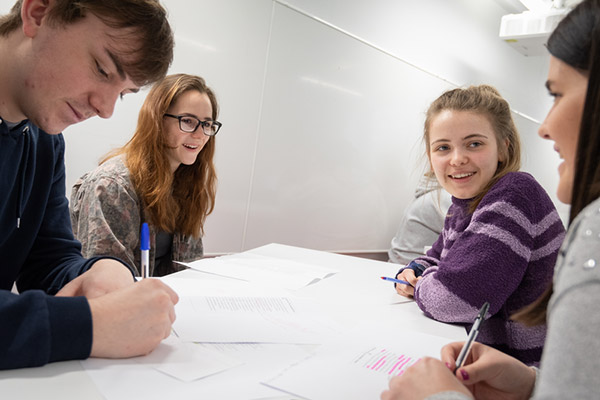View semester dates

BA (Hons) English and Linguistics
Discover both the art and science of language.
Year of entry: 2026/27
View semester dates
6th in the UK for English
=1st in the Russell Group for 'learning resources'
9th in the UK and world top 100
Why study English and linguistics at York?
Explore an extensive range of modules across two departments. In English, you’ll choose options covering all periods of literature from ancient classics to the present day, and explore literature from around the globe. You can also choose from options in film and creative writing. In linguistics, you’ll engage with language on a conceptual level and analyse raw linguistic data in detail, exploring syntax, semantics, phonetics, phonology, sociolinguistics, and more. Across the two subjects, you’ll be able to tailor your degree to your own interests.
Flexibility to add a Placement Year or Study Abroad. You’d then graduate with a BA in English and Linguistics (with Placement Year) or BA in English and Linguistics (with Study Abroad). Whether you’re interested in gaining experience in a particular industry or looking to expand your horizons by studying in another country, we’ll support you in exploring the options available to you.
Explore specialist Linguistics labs and facilities. Depending on the modules you choose, you’ll learn in dedicated spaces, including our e-lab. We’re also home to a premium multilingual interpreting and translation suite.
Gain valuable skills that will set you up for a range of careers. You’ll develop your research skills and address different briefs, becoming a skilled analytical thinker and problem solver. Our Careers and Employability Coordinator will help you to think about these skills in relation to employability and to navigate the resources and opportunities available, including internships, a placement year, and more. We regularly advertise careers events by industry experts.

Studying English/Linguistics at York has given me a unique insight into the cross section between language and text. My favourite part of the course so far has been studying the 'History of English' module and learning how language has evolved since its origin. This gave me relevant background for studying Beowulf in the 'Approaches to Literature' module, which I would have lacked had I not chosen the joint honours.
Marti, English/Linguistics student
Course content
You’ll cover a range of topics on English and foreign languages, linguistics, and literatures. Our innovative curriculum offers an international outlook that takes account of global contexts.
Year 1
In the first year of your degree, we’ll introduce you to the undergraduate study of English and Linguistics. Our modules will give you the skills you need to start undertaking literary and linguistic research, and advice on how to combine the two disciplines.
English
Core modules
We’ll introduce you to an exciting range of texts and critical approaches in your first year to lay the foundation for your degree. You’ll develop your knowledge of literary history by studying works from the medieval, Renaissance, early modern, eighteenth-century, Romantic, Victorian, and modern periods on our Approaches to Literature modules. Reading Now will introduce you to the necessary skills for the study of literature at university level.
Linguistics
Core modules
Your core modules in Linguistics are designed to give you a grounding in the basic vocabulary and concepts of linguistic theory, which will form the bedrock of your future study. You will cover topics such as:
Option modules
You'll study one option module:
Academic integrity module
In addition to the above you will also need to complete our online Academic Integrity module.
Year 2
In your second year, you'll study six option modules. Some option module combinations may not be possible. The options available to you will be confirmed after you begin your course.
English
Intermediate Option Modules
Our Intermediate Option Modules allow you to deepen your understanding of the relationship between literary works and the cultural, historical, and political contexts in which they were produced.
- The Shock of the New: Medieval Literature
- The Renaissance
- Inventing Britain, 1700-1830
- Victorians: British Literature, 1832-1901
- Age of Extremes: Twentieth-Century British and Irish Literature
- American Literature: From the First World War to the End of Empire
- Creative Writing: Contemporary Practice
World Literature Modules
Our World Literature Modules invite you to engage with questions of language, translation, and cultural difference in ways that equip you with important skills in linguistic analysis and description. Recent offerings have included the following:
- African Imaginations and Afrophone Literatures
- European New Cinema
- Eros: The Literature and Philosophy of Love
- Introduction to Greek and Roman Literature
- Modern French and Francophone Literature
- Modern Latin American Literature
- Medieval Arabic and Persian Global Literature
- The World of Beowulf
Linguistics
In the second year, you'll apply your core linguistic knowledge to new types of linguistic data, such as child language or regional varieties of English. At the same time, you will gain deeper theoretical knowledge in the core areas that you choose to pursue. You'll choose one of:
You can then choose any of the following options:
- Language Attitudes in Applied Contexts
- Teaching English as a Foreign Language I
- Teaching English as a Foreign Language II
- The Language of Turn and Sequence
- Middle English: Texts and Contexts
Elective modules
You may be able to replace one option module with an elective module, studying a complementary subject, a language or an interdisciplinary topic.
Year 3
Dissertation
You also have the option of undertaking a year-long dissertation (for which Research Now in Year 2 is required). This can either be an English and Related Literature Dissertation or a English and Linguistics Bridge Dissertation; the latter invites you to undertake a research project that brings the study of English and Linguistics together. Each version of this year-long advanced module offers you the chance to use all the research and writing skills you will have developed at York.
Option modules
You will study four option modules. Examples can be found below. Some option module combinations may not be possible. The options available to you will be confirmed after you begin your course.
English
In English, you will choose from the department’s Advanced Option Modules. These reflect the wide-ranging and cutting-edge research expertise of the Department, and our options cover literature from the classical period to the twenty-first century, as well as film and creative writing. Students can typically choose from around 30 options. Recent offerings have included:
- 21st Century American Fiction
- Black Writers of the Global Nineteenth Century
- Borders Bodies Bridges: Migration and Racialisation in Modern Literature and Culture
- Elemental: Contemporary Indigenous Literatures in English
- Fashion in the 18th Century
- From Tennyson to Tolkien: The Middle Ages and Modern Literature, 1840-1940
- Green Romanticism: Nature, Ecology, Calamity
- Modernism's Queer Spaces
- Pulp Fictions of Medieval England: Romance and Popular Literature
- Spices and Spies: Renaissance Global Travel
- The Stuff of Poetry
- The Villains of Romantic Gothic
- The Writer's Notebook: A Prose Fiction Workshop
Linguistics
In your final year, you can choose freely from a wide range of modules. You will have the opportunity to become proficient in all aspects of managing small-scale linguistic projects, from identifying the research questions, to communicating the findings. You can choose to specialise, follow your own interests and carry out original research. Options may include:
- A Usage-based View of Language
- Topics in Language Variation and Change
- Topics in Phonetics and Phonology
- Topics in Psycholinguistics: Language Processing
- Topics in Syntax
- Bilingualism
- Dialect Grammar of British English
- English Corpus Linguistics
- Forensic Linguistics
- Forensic Phonetics
- Multimodality: Language and the Body
- Neurolinguistics: Language and the Brain
- Phonological Development
- Psycholinguistics: Language Processing
- Dialect Grammar of British English
Elective modules
You may be able to replace one option module with an elective module, studying a complementary subject, a language or an interdisciplinary topic.
Our modules may change to reflect the latest academic thinking and expertise of our staff, and in line with Department/School academic planning.
Learning outcomes
Every course at York has been designed to provide clear and ambitious learning outcomes. These learning outcomes give you an understanding of what you will be able to do at the end of the course. We develop each course by designing modules that grow your abilities towards the learning outcomes and help you to explain what you can offer to employers. Find out more about our approach to teaching and learning.
Learning outcomes for this course
- Read diverse texts closely and critically, interpreting them with reference to the period and tradition in which they were produced, synthesizing information from secondary sources where appropriate.
- Analyse the affective power of language and narrative, and their cultural and political impact, and use this awareness better to understand the world and influence others.
- Select and deploy qualitative and quantitative research methods acquired through the study of the nature, use, and acquisition of language.
- Propose creative and principled solutions to linguistic problems and contribute them effectively to interdisciplinary teams, forming a bridge between humanities and scientific disciplines.
- Appreciate, engage with, and synthesize arguments from a variety of external standpoints, and interrogate their own assumptions, developing their critical practice in the light of self-reflection, peer review, and advice and feedback from others.
- Identify and formulate novel questions which advance critical debate within a range of disciplines, and approach them both individually and in teams, using advanced written and oral skills.
- Show sensitivity and perceptiveness concerning aspects of social, cultural, and political realities where language plays an important role and be able to highlight the relevance of literature- and linguistic-related issues in a globalized and interconnected world.
Fees and funding
The fees and funding information here is for students starting in the 2026/27 academic year.
If you take a year abroad or year in industry you'll pay a reduced rate of fees for that year.
Annual tuition fees
| UK (home) | International and EU |
|---|---|
| £9,535 (TBC) | £26,900 |
The UK government has announced its intention to increase tuition fees from £9,535 to £9,790 for the 2026/27 academic year. We expect this to apply to new UK (home) undergraduate students starting their studies in September 2026.
UK (home) or international fees?
The level of fee that you will be asked to pay depends on whether you're classed as a UK (home) or international student. Check your fee status.
Fees for subsequent years
- UK (home) fees may increase within the government fee cap in subsequent academic years. We will notify you of any increase as soon as we can.
- International fees are subject to increase in subsequent years in line with the prevailing Consumer Price Index (CPI) inflation rate (up to a maximum of 10%).
More information
For more information about tuition fees, any reduced fees for study abroad and work placement years, scholarships, tuition fee loans, maintenance loans and living costs see undergraduate fees and funding.
Additional costs
You'll need copies of the texts set for each module. Where possible, the Department works to arrange digital copies via the University Library. Where this is not practical, you'll be instructed in advance of the start of each term about the texts and editions you'll need to purchase (whether new or second-hand).
Funding
We'll confirm more funding opportunities for students joining us in 2026/27 throughout the year.
York, Oxford, Cambridge, Imperial
Just four UK universities are rated Gold for teaching and top ten for research* in the latest national assessment exercises.
* Awarded joint 10th in the Times Higher Education ranking of the Research Excellence Framework 2021.
Teaching and assessment
You’ll study and learn with academics who are active researchers, experts in their field and have a passion for their subjects. Our approach to teaching will provide you with the knowledge, opportunities, and support you need to grow and succeed in a global workplace. Find out more about our approach to teaching and learning.
Teaching format
In English, you’ll learn through a programme of seminars, lectures, workshops and one-to-one consultations. We emphasize small-group teaching, which means you’ll mainly be taught in seminars.
In Linguistics, you’ll learn through a mix of seminars, lectures, practicals and labs, as well as through independent study. Class sizes decrease as you advance through the degree. Lectures are accompanied by small-group teaching in seminars and practicals.
York’s English and Linguistics degree is renowned for its flexible and innovative approach.
- Our dedicated research informs all our teaching activities.
- Our friendly, approachable, and accessible staff are world-leading experts in their fields. They are each available to meet individually with you during weekly open office hours – two in English and at least one in Linguistics.
- We organise many guest lectures and readings by well-known critics, linguists, and writers.
In the UK, full-time students are expected to spend 1,200 hours a year learning. That's about 40 hours of classes and independent study each week during semesters. Everyone learns at a different rate, so the number of hours you spend on independent study will be different to other students on your course.
Facilities
Thin Ice Press is the Department of English and Related Literature’s in-house printing studio, whose iron presses chart the evolution of print from 1838-1926. They offer opportunities to experience the relationship between writing and printing practices through publication, practice-led research, teaching, and public workshops.
Teaching location
You will be based in the Department of English and Related Literature and the Department of Language and Linguistic Science on Campus West.
Your contact hours will be divided between various locations around Campus West, including Vanbrugh College, Derwent College and the Spring Lane Building.
About our campus
Our beautiful green campus offers a student-friendly setting in which to live and study, within easy reach of the action in the city centre. It's easy to get around - everything is within walking or pedalling distance, or you can use the fast and frequent bus service. Take a campus tour.
Assessment and feedback
The Department of English and Related Literature employs a variety of assessment methods, including group projects and open exams, but with a strong emphasis on essay writing. Your main mode of assessment will be essays, which will range from short exploratory exercises to more detailed discussions on a topic of your choice.
The Department of Language and Linguistic Science also uses varied assessment methods, including closed and open exams, coursework, extended essays, group oral presentations, lab reports and practicals.
Both departments offer high levels of feedback and ample opportunities for you to meet with staff to discuss your written work.
Careers and skills
Studying English and Linguistics at York will provide you with numerous career possibilities. You’ll learn presentation, language and critical thinking skills during your combined degree, and gain expertise in complex analysis and research. These skills suit a wide range of careers, from law and teaching to national and local government and the creative industries.
Career opportunities
- Advertising, marketing, and public relations
- Arts administration
- Civil and diplomatic services
- Creative industries
- Journalism and broadcasting
- Law
- Librarianship
- Publishing
- Speech and language therapy
- Teaching, including Teaching English as a Foreign Language
- Translation services
Transferable skills
- Ability to analyse and compare complex texts
- Capacity to write clearly and fluently for a variety of audiences
- Communication and teamwork skills
- Critical and analytical thinking
- Data interpretation
- Experience of researching and debating challenging topics
- Independent study skills
- Logic and rhetoric
- Proficiency in presenting findings cogently and persuasively using information technology
Entry requirements
| Qualification | Typical offer |
|---|---|
| A levels | AAB including an A in English Literature (English Language and Literature is also acceptable) |
| Access to Higher Education Diploma | 36 credits at Distinction, including at least 9 credits in Literature-related units, and 9 credits at Merit or higher |
| BTEC National Extended Diploma | DDD with an additional A Level or equivalent qualification in English Literature at grade A |
| European Baccalaureate | 80% overall, with 85% in English Literature. |
| International Baccalaureate | 35 points including 6 in English Literature at Higher Level (Higher Level English Language and Literature is also acceptable) |
| T levels | We are currently not accepting T Levels for this course unless an additional A Level (or equivalent qualification) in English Literature has been taken. |
| Scottish Highers / Advanced Highers | Advanced Highers - B in English Literature Scottish Highers - BBBB We may also be able to consider three Advanced Highers or a combination of Highers and Advanced Highers, where an applicant does not meet the grade requirement through Highers alone. Please contact us to discuss your qualifications. |
| Other international qualifications | Equivalent qualifications from your country |
Alternative offers
Meeting the following additional criteria may qualify you for an alternative offer.
| Criteria | Adjustment |
|---|---|
| Widening participation | BBC including B in English Literature (English Language and Literature is also acceptable) This is conditional upon successful completion of the WP programme including the YorJourney module (Black Access Programme, Next Step York) or successful completion of Realising Opportunities More about widening participation. |
| Contextual offer | ABC including an A in English Literature (English Language and Literature is also acceptable) |
| EPQ | If you achieve A or higher in the EPQ, you may be eligible for an alternative offer up to one A level grade (or equivalent) below our typical offer. |
| MOOCs | If you successfully complete our online course Accents, attitudes and identity, you may be eligible for an alternative offer up to one A level grade (or equivalent) below our typical offer. Details about how to evidence completion of the MOOC will be sent in your offer letter. Please note: you do not need to pay for the certificate. More about MOOCs. |
English language
If English isn't your first language you may need to provide evidence of your English language ability. We accept the following qualifications:
| Qualification | Minimum requirement |
|---|---|
| IELTS (Academic) | 6.5, with a minimum of 6.0 in each component |
| IB English | A score of 4 in English A or 5 in English B (Higher Level or Standard Level) |
| Cambridge CEFR | 176, with a minimum of 169 in each component |
| Oxford ELLT | 7, with a minimum of 6 in each component |
| Oxford Test of English Advanced | 136, with a minimum of 126 in each component |
| Duolingo | Integrated subscores: 120 overall, with a minimum of 105 in each component |
| GCSE/IGCSE/O level English Language (as a first or second language) | Grade C / Grade 4 |
| LanguageCert SELT | B2 with a minimum score of 33/50 in each component |
| LanguageCert Academic | B2 with a minimum score of 33/50 in each component |
| Kaplan Test of English Language | 478 Main Flight score with 444 in each component |
| Skills for English | B2: Merit overall, with Pass with Merit in each component |
| PTE Academic | 61, with a minimum of 55 in each component |
| TOEFL | 87 overall, with a minimum of 21 in each component (taken before January 2026) 4.5 with 5 in Listening and 4.5 in each other component (taken after January 2026) |
| Trinity ISE III | Merit in all components |
| Other English language qualifications | We also accept other English Language qualifications, including various school-leaving certificates. |
For more information see our undergraduate English language requirements.
If you haven't met our English language requirements
You may be eligible for one of our pre-sessional English language courses. These courses will provide you with the level of English needed to meet the conditions of your offer.
The length of course you need to take depends on your current English language test scores and how much you need to improve to reach our English language requirements.
After you've accepted your offer to study at York, we'll confirm which pre-sessional course you should apply to via You@York.
Next steps
Contact us
Get in touch if you have any questions
English Undergraduate Admissions
Discover York








